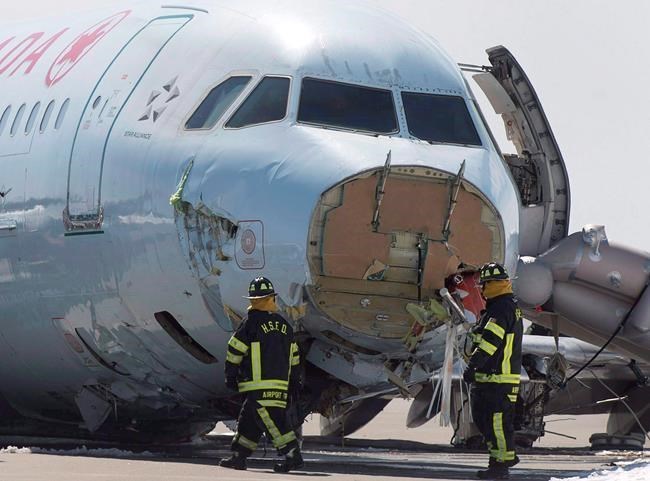
Airport firefighters work at the crash site of Air Canada AC624 that crashed early Sunday morning during a snowstorm, at Stanfield International Airport in Halifax on Monday, March 30, 2015. THE CANADIAN PRESS/Andrew Vaughan
Republished November 25, 2022 - 12:01 PM
Original Publication Date November 25, 2022 - 7:41 AM
OTTAWA - The cockpit voice recording from an Air Canada plane that crashed on a Halifax runway can be disclosed to parties in a class-action lawsuit, the Supreme Court of Canada has ruled.
In a 7-2 judgment Friday, the top court upheld a Nova Scotia judge's decision to make the recording available on the basis it contained information that was reliable, relevant and key to resolving the dispute.
Several people were injured when Flight AC624 landed in wind and heavy snow in late March 2015, prompting a lawsuit against Air Canada, plane manufacturer Airbus S.A.S. and others.
The plane, arriving from Toronto, hit the snow-covered terrain short of the runway, bounced into the air and struck the ground twice more before sliding along the tarmac and coming to rest. Twenty-five people were taken to hospital.
In preparing a public report on the accident, the federal Transportation Safety Board drew on a variety of materials, including the recording of conversations among flight crew members and other sounds in the cockpit.
A statutory privilege of confidentiality applies to cockpit voice recordings, meaning the authorization of a court or coroner is needed before they can be used in legal proceedings.
Airbus S.A.S. sought access to the voice recording and a transcript, arguing it was necessary for a fair trial — a move the Transportation Safety Board, though not a party in the class action, opposed in court.
A Nova Scotia judge refused to allow the safety board to make submissions in the absence of other parties and the public. He also directed the board to produce a copy of the recording and transcript for use in the class action under "very stringent conditions," limiting disclosure to the parties and their experts, consultants, insurers and lawyers in order to preserve confidentiality.
The Nova Scotia Court of Appeal upheld both the refusal to hear private submissions and the disclosure order, prompting the safety board to take its case to the Supreme Court of Canada.
The board contended that Parliament's aim in establishing the privilege attached to cockpit voice recordings — protecting pilot privacy and promoting public safety in air transportation — would be undermined if the Halifax recording were disclosed in the class action.
In writing for a majority of the Supreme Court, Justice Nicholas Kasirer found the Nova Scotia judge made no reviewable error in refusing to allow the board to make closed-door submissions in the matter, nor in ordering disclosure of the recording.
Kasirer said it was evident the judge applied the correct test concerning disclosure, properly identifying and weighing the two competing interests — the public interest in the proper administration of justice and the public interests underlying the privilege.
"The overall weighing of the factors by the chambers judge was fact-driven and discretionary. Based on the evidence and the strength of his findings of fact, he was entitled to conclude that limited production should be ordered," Kasirer wrote.
"Others might have balanced differently by assigning more weight to some of the factors and less to others in the circumstances. But absent an error of law, a palpable and overriding error of fact or proof that discretion has been abused, the chambers judge’s balancing should not be disturbed."
Raymond Wagner, a lawyer representing passengers in the class action, said Friday in a statement the plaintiffs have been seeking justice for seven years, and the Supreme Court decision means the case can now advance.
"Our clients need closure."
This report by The Canadian Press was first published Nov. 25, 2022.
News from © The Canadian Press, 2022